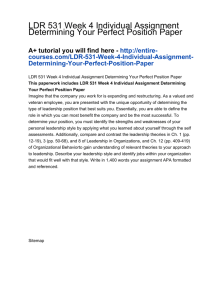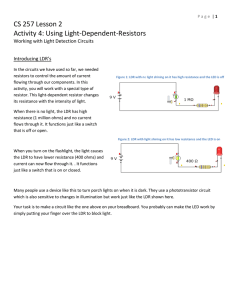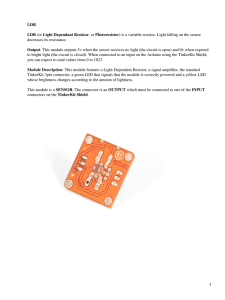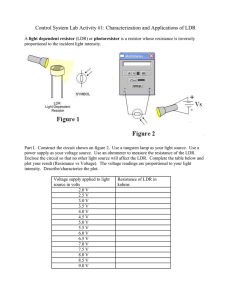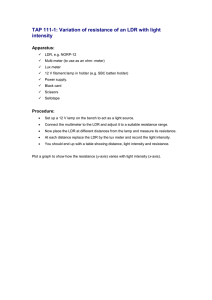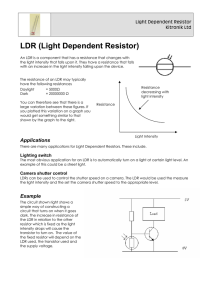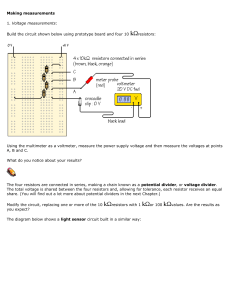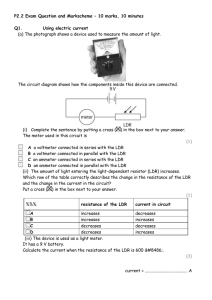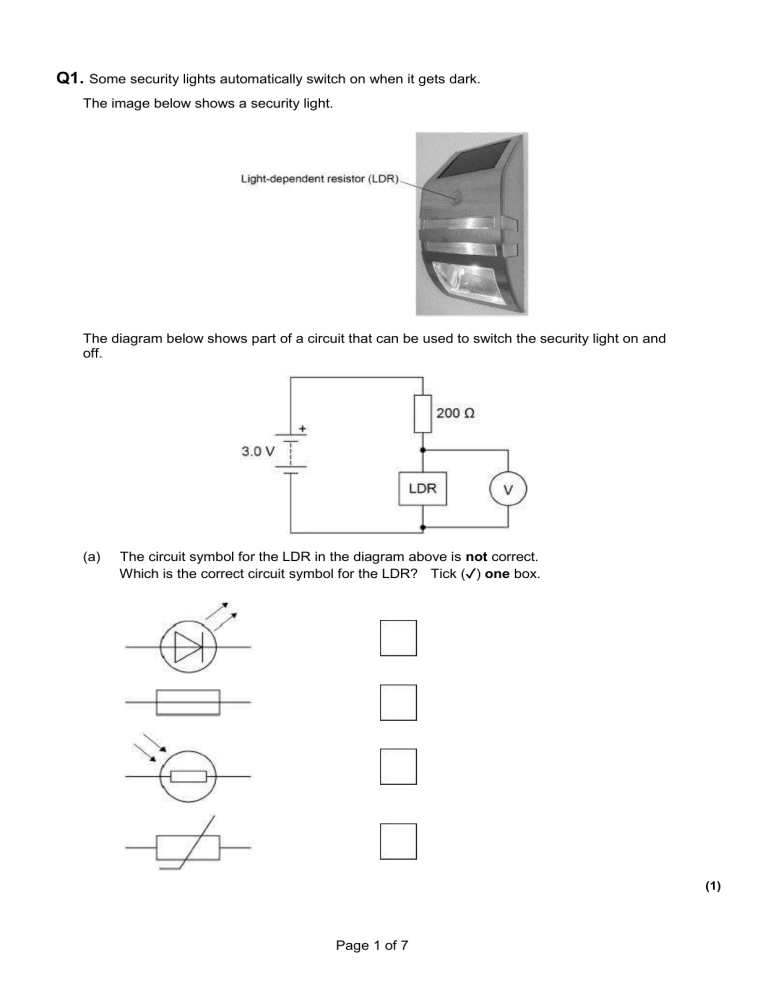
Q1. Some security lights automatically switch on when it gets dark. The image below shows a security light. The diagram below shows part of a circuit that can be used to switch the security light on and off. (a) The circuit symbol for the LDR in the diagram above is not correct. Which is the correct circuit symbol for the LDR? Tick (✓) one box. (1) Page 1 of 7 (b) The security light turns on when the potential difference across the LDR is 2.0 V Determine the resistance of the LDR when the potential difference across the LDR is 2.0 V Use the diagram above. ___________________________________________________________________ ___________________________________________________________________ ___________________________________________________________________ Resistance = _______________ Ω (2) (c) A charge of 3.24 C flows through the LDR in 40.0 minutes. Calculate the current in the LDR. ___________________________________________________________________ ___________________________________________________________________ ___________________________________________________________________ ___________________________________________________________________ ___________________________________________________________________ ___________________________________________________________________ ___________________________________________________________________ Current = _______________ A (4) (d) Sometimes dirt can cover the LDR on the security light. What effect would dirt on the LDR have on the security light? Tick (✓) one box. The security light would always be off. The security light would always be on. The security light would only be on during the day. The security light would only be on during the night. (1) (Total 8 marks) Page 2 of 7 Q2. A student built a circuit using filament lamps. (a) Sketch a current potential difference graph for a filament lamp on Figure 1 Figure 1 (2) Figure 2 shows the circuit with two identical filament lamps. Figure 2 (b) Compare the currents I1, I2 and I3 ___________________________________________________________________ ___________________________________________________________________ ___________________________________________________________________ (2) Page 3 of 7 (c) Calculate the charge that flows through the cell in 1 minute. Each filament lamp has a power of 3 W and a resistance of 12 Ω Write any equations that you use. Give the unit. ___________________________________________________________________ ___________________________________________________________________ ___________________________________________________________________ ___________________________________________________________________ Charge = _________________ Unit = _________________ (6) (d) The student builds a different circuit. Figure 3 shows the circuit. Figure 3 Explain how the readings on both meters change when the environmental conditions change. ___________________________________________________________________ ___________________________________________________________________ ___________________________________________________________________ ___________________________________________________________________ ___________________________________________________________________ ___________________________________________________________________ ___________________________________________________________________ ___________________________________________________________________ ______________________________________________________(6) (Total 16 marks) Page 4 of 7 Mark schemes Q1. (a) 1 (b) p.d. across 200 (Ω) resistor = 3.0 – 2.0 = 1.0 V 1 so resistance of LDR is 400 (Ω) allow a justified calculation of current and resistance I= = 5 × 10–3 (A) (1) 2 = 5 × 10–3 × R R = 400 (Ω) (1) 1 (c) t = 2400 (s) 1 3.24 = I × 2400 this mark may be awarded if t is incorrectly or not converted 1 I= this mark may be awarded if t is incorrectly or not converted 1 I = 0.00135 (A) or I = 1.35 × 10–3 (A) allow an answer consistent with their value of t incorrectly or not converted 1 (d) the security light would always be on 1 [8] Q2. (a) a curve in the first and third quadrants only, passing through origin 1 decreasing gradient Page 5 of 7 1 (b) any two from: • I1 = I2 + I 3 • I2 = I3 • I1 = 2I2 • I1 = 2I3 allow 1 mark for each correct description given in words 2 (c) 3 = I2 × 12 1 1 I = 0.5 (A) 1 Q = 0.5 × 60 = 30 allow Q = their calculated I × 60 1 Qtotal = 60 allow an answer that is consistent with their calculated value of I 1 or 3 = I2 × 12 (1) I = 0.5 (A) (1) Itotal = 1.0 (A) (1) allow Itotal = their I × 2 Q = 1.0 × 60 = 60 (1) allow an answer that is consistent with their calculated value of I coulombs or C 1 an answer of 60 scores 5 calculation marks (d) Level 3: Relevant points (reasons / causes) are identified, given in detail and logically linked to form a clear account. 5−6 Page 6 of 7 Level 2: Relevant points (reasons / causes) are identified, and there are attempts at logically linking. The resulting account is not fully clear. 3−4 Level 1: Points are identified and stated simply, but their relevance is not clear and there is no attempt at logical linking. 1−2 No relevant content 0 Indicative content • • resistance of LDR changes when light intensity changes when light intensity increase resistance of LDR decreases • • • overall resistance of circuit decreases potential difference across total resistance remains unchanged current in ammeter increases • • • potential difference across fixed resistor increases potential difference across LDR decreases reading on the voltmeter decreases • • potential difference is shared between the components in series the lower the resistance of the LDR the smaller the share of the potential difference reading on the voltmeter decreases • [16] Page 7 of 7
